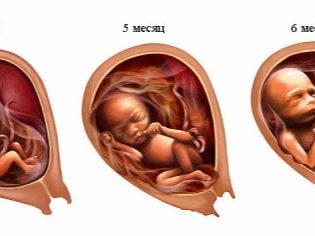Sixth month of pregnancy
Sixth month of pregnancy smoothly completes the perfect time for a relatively easy and easy-going second trimester. The third will begin, and it will no longer be so cloudless. To hide the pregnancy from others in the sixth month is already quite difficult: the future mother's belly grows very intensively, the waist is almost imperceptible. Everything in the body of a woman begins to prepare for childbirth in advance.
Term General Information
The sixth month is the last in the second trimester. If we are talking about the obstetric month, then it will include the 22nd, 23rd, 24th and 25th weeks of pregnancy. The sixth calendar month includes the 23rd, 24th, 25th and 26th weeks.. This discrepancy arises because of the difference in the way to count the term: obstetricians count from the first day of the last menstruation, with exactly 4 weeks in each obstetric month (like the moon). In pregnancy, exactly 10 obstetric months.
Calendar months contain more days (30–31), and therefore, the week sequence numbers are slightly ahead of obstetric months. There are exactly 9 months in pregnancy.
No matter how, count from the first day of the last menstruation and focus on the period from 22 to 26 weeks inclusive. This period we consider in more detail.
Fetal development
Your baby at this time is entering a new most important milestone in its development - he has completed the formation and development of the alveoli, his lung tissue begins to prepare for independent breathing. Begins the gradual development of a special substance - surfactant. The alveoli are tiny bubbles. When you first inhale, they will be filled with air, but when you exhale, their walls can stick together, and then acute respiratory failure develops - one of the most common causes of death of newborns immediately after birth.
It is important that the surfactant accumulates enough, and then the baby alone can breathe without problems. It is the accumulation of surfactant from 6 months until the birth of the child in the womb and will be engaged. And besides, there will be other interesting metamorphoses that should be considered weekly.
22 week
This is a remarkable week, it gives a new status to the fetus. Now, if, for some reason, contractions begin, water flows away, what is happening will not be considered a miscarriage. This will be premature birth, and doctors will be obliged to save the baby. Almost all children at this time reach 500 grams in weight, and their growth is already very solid - up to 30 centimeters.
Previously, the standards of medical care implied that resuscitation measures provided only a child who has reached a weight of 500 grams, now they are saving children who weigh less. True, without guarantees. The chances of survival of a baby born at 22 weeks will be low: there is not enough surfactant yet, there is not the right amount of subcutaneous fat, such a baby will not be able to breathe or retain its body heat. Outside resuscitation, he can not exist. And even if he survives, it is likely that the child will be disabled.The nervous system (paralysis, paresis) and sensory organs (blindness, deafness) are most often affected. The task of the mother at the beginning of 6 months is to do everything to prevent preterm birth, to comply with all the recommendations of the doctor.
The child on this period becomes more emotionally developed. If you press your palm to the stomach, it will respond with a revival, with loud and harsh sounds, the crumb gets scared, starts to "rush" and is already quite weightily pushed from the inside. Baby looks almost like a newborn. It remains to dig up the subcutaneous fat.
23 week
Dramatic changes are taking place with the child. In one week he manages to add about 20% of his total mass, and this is a new record. By the end of this seven day period babies weigh an average of 550-590 grams with growth of about 30 centimeters.
It should be noted that from this period on the standards of height-weight is no longer worth. Embryos developed at about the same speed and looked almost the same. But now your child is a personality. He has genetically incorporated features: the size of the nose and the length of the legs and arms, complexion. If the parents are high, then the child will have considerable growth, if they are short, the fruit will be slightly smaller. However, in the weight of the same intensively they will add both.
At this time sweat and sebaceous glands begin to work.
The ear is well developed, and the kid already has his own preferences: he likes some sounds, others do not. Theoretically, you can begin to acquaint the child with a musical classic - usually children in the womb love Vivaldi, Chopin and Beethoven very much.
24 week
By the end of this week weight increases to 600-650 grams. Baby is growing up to 31 centimeters. The movements of the children are becoming more active, more and more often mothers begin to notice that their children already have their own character and have their own temperament: some are calm and drowsy, others are restless.
Begins active loss of light translucent hair that covers the skin - lanugo. Together with them the abundance of cheese-like lubricant leaves, and the child begins to look more attractive. The skin begins to smooth, the cheeks are already there, it remains to form the buttocks.
25 week
Improve reflexes that will help the baby survive in new living conditions after he is born. Already, the child has several dozens of reflex skills: he knows how to suck and swallow, has prehensile and tendon reflexes, has learned to blink, spit, has a self-preservation instinct.
The fruit grew to 34 centimeters, "heavy" up to 800 grams. A gradual change in the color of the skin and hair begins. If all the children were blond until the sixth month, then now there are brown-haired, brunette and redhead, and the skin becomes pinkish instead of rich red. If the child is black, then right now his skin will receive a characteristic pigment.
If childbirth occurs now, WHO estimates the chances of survival at 15–17%.
Your child began to dream. At the same time, the phase of REM sleep prevails over the slow phase. It is difficult to say what a baby sees in this period in a dream. Most likely, his dreams are closely related to his everyday life: the beat of his mother's heart and the sound of her voice, with the umbilical cord.
26 week
The last days of the sixth month fall at 26 obstetric week. She completes the second trimester. Children begin to take a headache. Up to 90% of babies behave this way. The remaining 10% are sitting or lying across, but they still have enough time to roll over, - there is enough space in the uterus for such "maneuvers".
By the end of the sixth month babies grow up to 35 centimeters and weigh from 800 to 900 grams. Olfactory receptors begin to form, and in boys, the testicles begin to descend from the abdominal cavity, where they were formed, into the scrotum, where they are supposed to be.
If childbirth occurs at the end of the sixth month, then the survival rate is on average up to 35%.
Well-being of the future mother
From the sixth month begins to grow belly. Even those who are worried about the fact that the tum does not arrive, are now thinking about changing their wardrobe: the stomach is growing at a tremendous rate and from week to week it becomes more noticeable to others - and it makes no sense to hide something. Soon the woman will go on maternity leave. In the seventh month, she will be given a sick leave for pregnancy and childbirth.
The production of placental lactogen is activated, and from this month the mammary glands of the expectant mother begin to actively prepare for breastfeeding. Many have already noticed that the large and lush breasts (and she became just that, regardless of the bust size before pregnancy!), Began to produce colostrum. From this month, it is advisable to engage in the preparation of the breast for breastfeeding coming after childbirth.
First, it is important to properly care for the mammary glands: twice a day to wash them with warm water to prevent infection in the milk ducts, because colostrum is a nutrient medium, almost ideal for the reproduction of pathogenic bacteria.
Secondly, now we need a special supporting bra from natural fabrics and with wide straps. If there is an itch associated with stretching the skin in the area of the mammary glands, you should moisturize the skin with special anti-stretch agents., heated with vegetable oils or fatty baby cream.
Experts advise you to wipe your nipples only with a rough towel: it will stimulate and prepare them for feeding the baby. However, it is important to know the measure: excessive stimulation of the nipples causes the production of oxytocin in the body, which can cause the onset of preterm labor.
In primiparas (and in some cases, and experienced moms), training fights can start - intermittent, non-systematic strains of the uterine muscles. They are also called false fights or Braxton Hicks contractions. You should not be afraid, because this is a normal, nature-based process - so the uterus prepares for real contractions that begin in labor.
If there are no training bouts, you also should not worry - this is also an absolute norm. In itself, the start of training bouts does not mean that a woman is threatened with premature birth.
Weight gain can already reach 7–8 kilograms, and this is quite a significant load on the legs, lower back and back. By the end of the sixth month, the legs begin to get tired more often, especially after a hard day's work, hemorrhoids can worsen and varicose veins appear.
The amount of circulating blood has increased significantly, because now, in fact, there is a third circle of blood circulation - the uteroplacental. For this reason, a woman can sometimes experience shortness of breath and rapid heartbeat. Increased production of blood cells often leads to a decrease in hemoglobin, which simply “does not have time” for the increased blood circulation, and then anemia develops.
- Allotment. Normally remain transparent or white, without itching, odor, or with a slightly acidic. They may have a slightly yellowish tint due to the high level of progesterone in the body. This month, the condition of leukorrhea is also considered the norm - highlighting whiter. This is due to the strong blood supply to the mucous membranes of the genital tract. If whites are plentiful and interfere, you can use sanitary pads. It is also important to wash away more often in order to exclude the reproduction in the nutrient medium of vaginal secretions of pathogenic organisms.
- Uterus. The lower back and lower abdomen hurt due to the displacement of the center of gravity, and sometimes due to the pinching of some nerve endings, because the bottom of the uterus has already risen to the level of the female navel. Internal organs must be forced to make room.The size of the uterus is already so large that a stomach is squeezed, and now a woman can suffer from heartburn due to the fact that the reproductive organ squeezes the digestive organ from the bottom, causing a reflux of gastric juice into the esophagus.
- Pigmentation. Pigment spots of different sizes may appear, existing moles and freckles become brighter. There is no need to worry - in a few months after birth the pigmentation will return to normal and freckles and moles will again become hardly noticeable.
- Against the background of calcium deficiency, fingers can go numb, cramp legs (gastrocnemius muscles), especially often these sensations appear at night. It is important to talk with the doctor and start getting calcium supplements.
Mood and emotional background remain stable. But stress is still better to carefully avoid, because the effects of stress hormones on the fetus (by the way, they penetrate the placental barrier) can be very deplorable.
Recommendations on this term
It may be easier to survive the sixth month by following some simple recommendations.
- Limit physical exertion. Reduce them by about 30% from the original. The best ways to keep fit, prepare for childbirth and do not harm the baby are walking in the fresh air, swimming. But categorical it is necessary to refuse diving from a springboard and fast immersion (diving). Also, do not swim in stagnant natural bodies of water (lakes, ponds): there is a chance of becoming infected with infections that are transmitted with stagnant water. It is not forbidden to ride a bike, but common sense should tell a woman that much better to use the exercise bike (you can fall off the bike).
- Start doing yoga for pregnant women and breathing exercises. Now is a very good time to start breathing correctly, to train the breath that you will use in labor to reduce pain and ease the birth process.
- To facilitate carrying a baby at the end of the second and especially in the third trimester will help wearing a special antenatal bandage. Check with your doctor and go after him to the orthopedic salon.
- Try not to drink too much fluid and do not sit (lie) for too long in one position. - may develop swelling.
Dangers: what is allowed and prohibited?
Still allowed a lot, but with a number of restrictions.
- Sex. You can have sex only if the doctor has no reason to suspect the threat of premature birth, if there is no placenta previa and a functional failure of the cervix (ICN). Pose for love joys is better to choose such that the grown belly does not have pressure, also you should not use sex toys, lubricants and practice anal sex now. The partner needs to be more delicate. Orgasm can not harm the child, for this you can not worry. In women at this time, increased blood supply to the genitals causes a strong sexual desire - this can and should be used in the absence of pregnancy complications.
- Travels. If you have not been to the sea on vacation and really want to fly by air, before the trip, it is advisable to consult with a gynecologist. You can fly on airplanes, but before that it is still better to secure the consent of the gynecologist. In the sixth month, most airlines do not ask a woman in the position of a certificate from a doctor that she can make a flight, but there are also such companies that can already ask for such a certificate, and therefore it is better to take it from your gynecologist before the trip.
- Alcohol is still banned. Even champagne. Even at the wedding of the best friend.
- No self treatment. The common cold and flu are not as dangerous now as in the early stages, since the baby is reliably protected by the placenta and fully formed, but the wrong treatment of the common cold and flu can cause significant harm.
If there is blood from the genital tract, bleeding occurs, the abdomen pulls them, contractions begin, water has withdrawn, you must immediately call the Ambulance. Remember: this month babies are already viable.
Analyzes and surveys
No significant and large-scale surveys take place this month. A woman visits a gynecologist in a female consultation is still 1 time per month, if there are complications of pregnancy - once every two weeks.
The future mother will be weighed, blood pressure will be measured (at this time it should be below the norm, and this is the physiologically determined norm with increased blood circulation and increased heart rate). The doctor will ask about the presence of edema on the hands and feet, on the face. If there is overweight or swelling, prescribe a salt-free diet.
In some cases, according to individual indications, an ultrasound scan or a ultrasound scan (Doppler ultrasound scan) can be prescribed to assess the uterine-fetal blood flow and the characteristics of the baby’s circulation. The sex of the child is clearly visible on the ultrasound examination until the middle of the sixth month. Then the probability of precise determination will begin to decrease: the fetus becomes cramped, so it starts to assume a flexion position, while the umbilical cord and handles often turn out between the legs - it becomes very difficult to examine the genitals. Therefore, if the gender is still unknown, it's time to find out this question. After 20 weeks, the accuracy of determining the sex is the highest - up to 85%.
You will learn more about the development of the fetus in the sixth month from the video below.






























